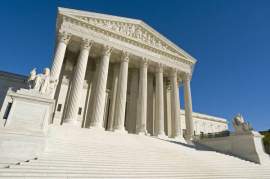
The Shays’ Rebellion

Popular In Constitution
Purpose Of Lifetime Appointment And Pros And Cons Enumerated Powers Bicameral Legislature Background Article 3 Of The Constitution We The People 1st Amendment Who Wrote The Constitution Judicial Review Equal Protection Clause 5th Amendment 10th Amendment Three Fifths Compromise
Between the years of 1786 to 1787, Daniel Shays, a Massachusetts farmer and a Revolutionary War veteran, amassed over 5,000 bankrupt farmers and organized a rebellion against a sovereign Massachusetts State Government. The rebellion was spawned in the wake of the ratification of the Articles of Confederation, which granted sovereignty to each of the 13 states, thereby forbidding any type of involvement on the part of a central government.
The Articles of Confederation refused the central government the right to taxation, and as a result, they could merely request individual State funding in forms of donations. Furthermore, they were powerless to combat any refusal of payment made by any individual State. However, the Articles of Confederation allowed the central government the authority to coin money. This proved to be financially insoluble because the central government had expenses, such as the upkeep of both a national military, as well as a national postal service. Yet, due to insufficient funds, the central government was forced to coin money without any reasonable financial backing, instantly devaluing the national currency.
The flooding of the commercial market with what was essentially worthless currency sent the central government spiraling into financial ruin. In addition, foreign investors and British landholders were unanimously demanding the repayment of all debts. Because the individual states were granted the authority to regulate all trade and tariff regulation, they began to institute exorbitant, and what Daniel Shays considered to be unjust, tariffs on interstate trade. As a result, farmers (and other working class merchants) were unable to participate in commerce on account that they could not afford the heightened tariffs. As their property became foreclosed, their families starved and their loved ones were forced into debtor’s prison, Daniel Shays saw no other option but to rebel against the sovereign Massachusetts State Government. His rebellion was known as Shays’ Rebellion.
Though only leading a force of 5,000 farmers and merchants, Shays’ Rebellion lasted for a full year because the Articles of Confederation forbid the central government to interfere or involve itself in any State’s respective issues. As a result, the Massachusetts State militia engaged in fierce combat with Daniel Shays’ militia. Had the central government been allowed jurisdiction over remedying the damage caused by Daniel Shays’ rebellion, it would have sent the national militia to intervene. Yet due to governmental regulations set forth in the Articles of Confederation, the central government could only idly observe the disarray.
As a result of the central government’s flooding of the commercial market with valueless paper money, each State’s monetary situation suffered as well. As their funds began to deplete, they were forced to enforce commercial tariffs that quickly bankrupted a majority of its working-class citizens whom relied on trade in order to sustain themselves and their families. The Massachusetts State Government was considered by its citizens to be exceptionally unfair in its trade and tariff regulation.
As the Massachusetts State Government hiked in tariff rates, allowed permission to do so by the Articles of Confederation, neighboring states refused to engage in trade relations as a result of the astronomical tariffs enforced by the Massachusetts State Government. The collapse of Massachusetts's commercial industry coupled with the State Government’s requirement to satisfy its foreign debt forced Shays’ militia to rebel.
Though Shays’ Rebellion was considered to be a small-scale uprising, with a minimal amount of violence or damage caused, it illustrated the fundamental inefficiencies of the Articles of Confederation. Furthermore, Shays’ Rebellion was not looked at as an isolated event by the Federalists. It was viewed as a preview of events to come as a result of a weak centralized government.
NEXT: What It Meant to be an Anti-Federalist




















